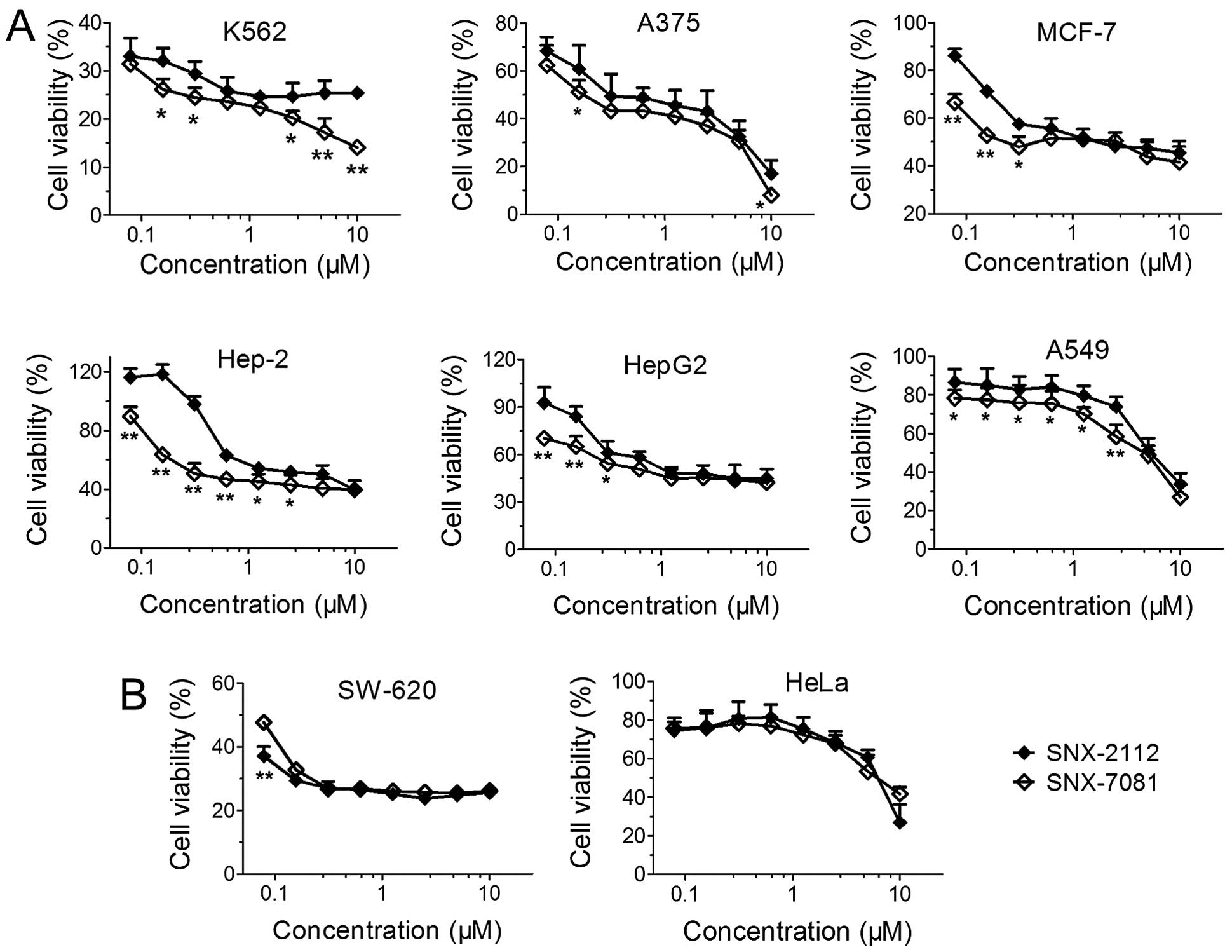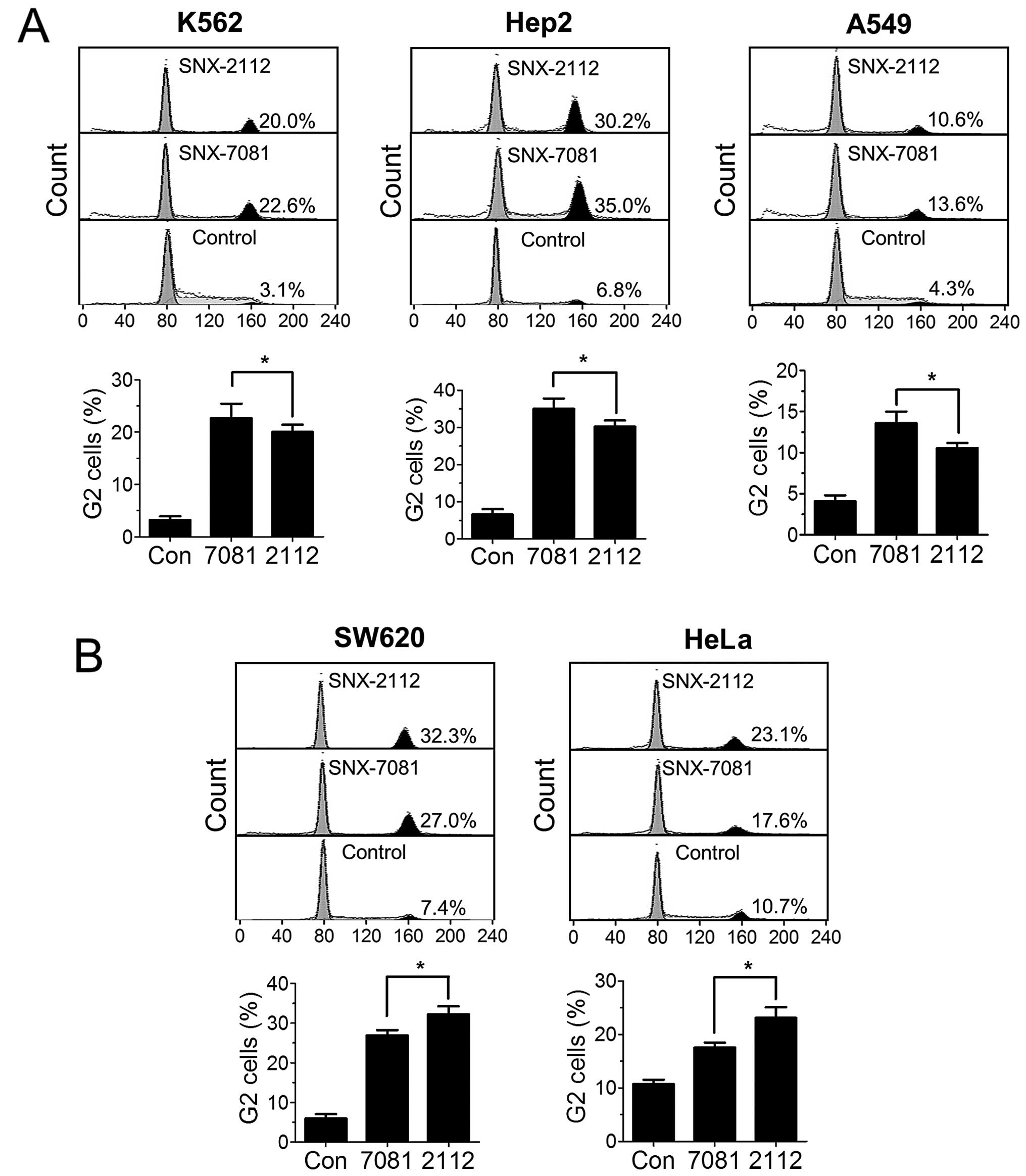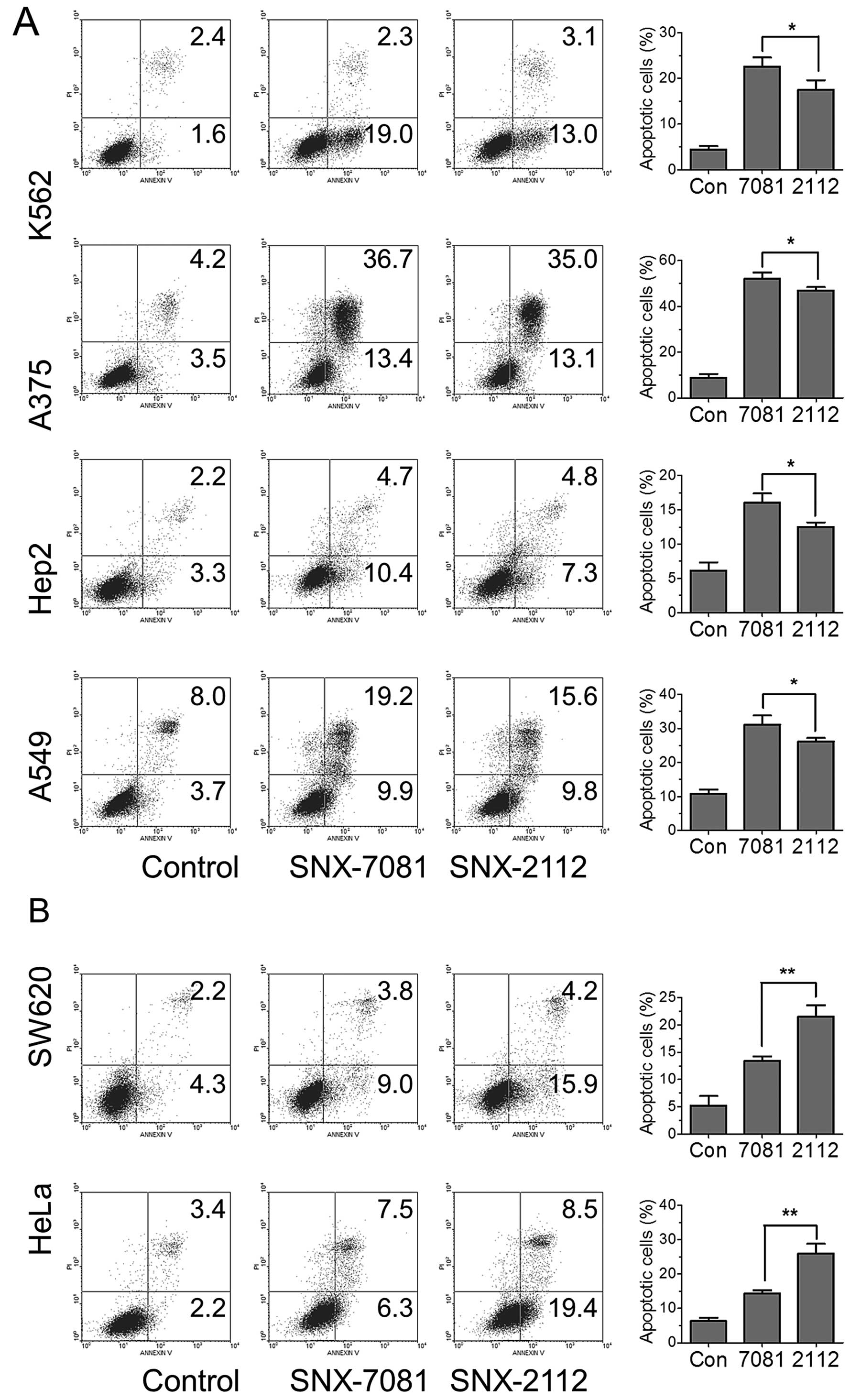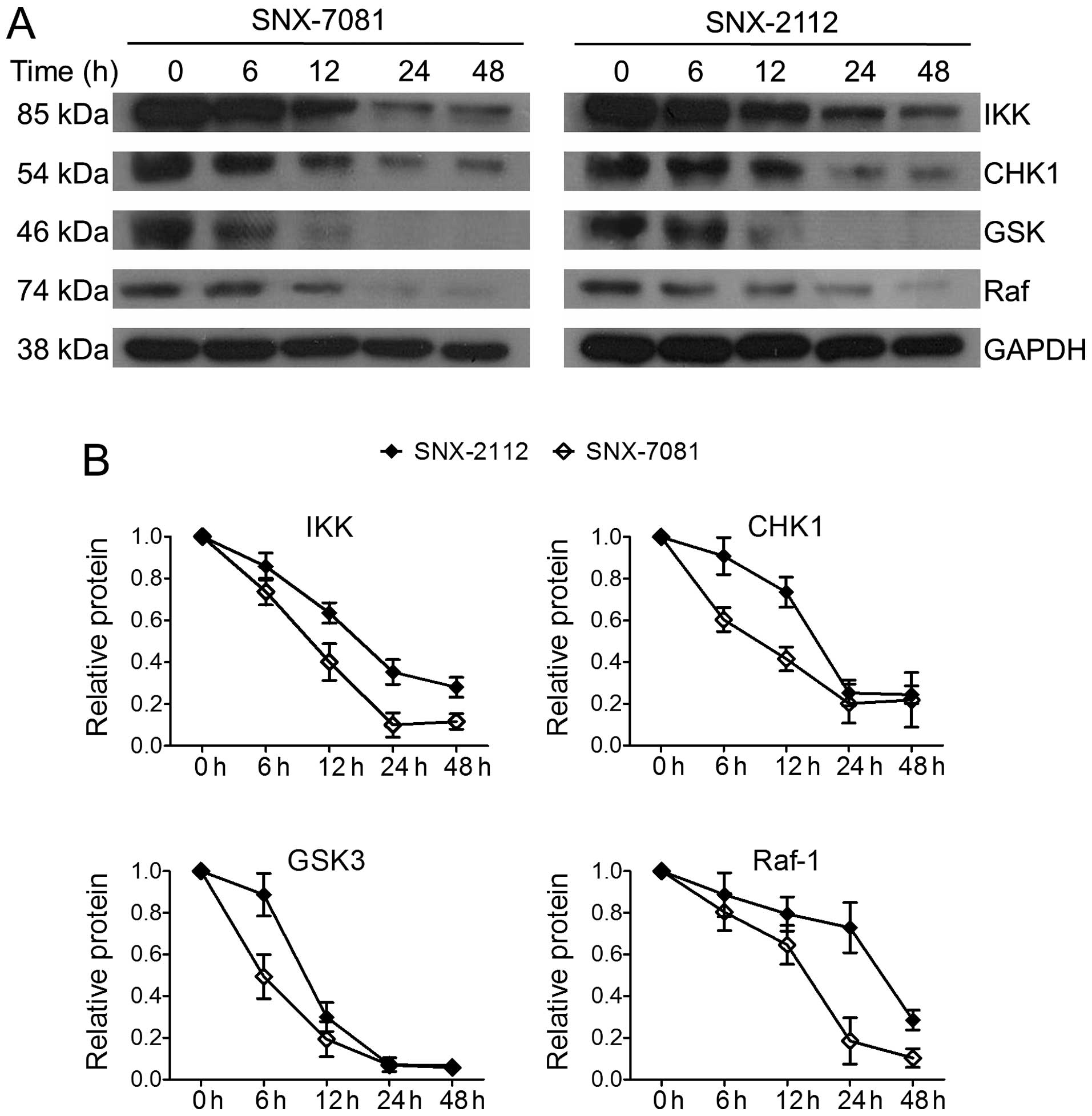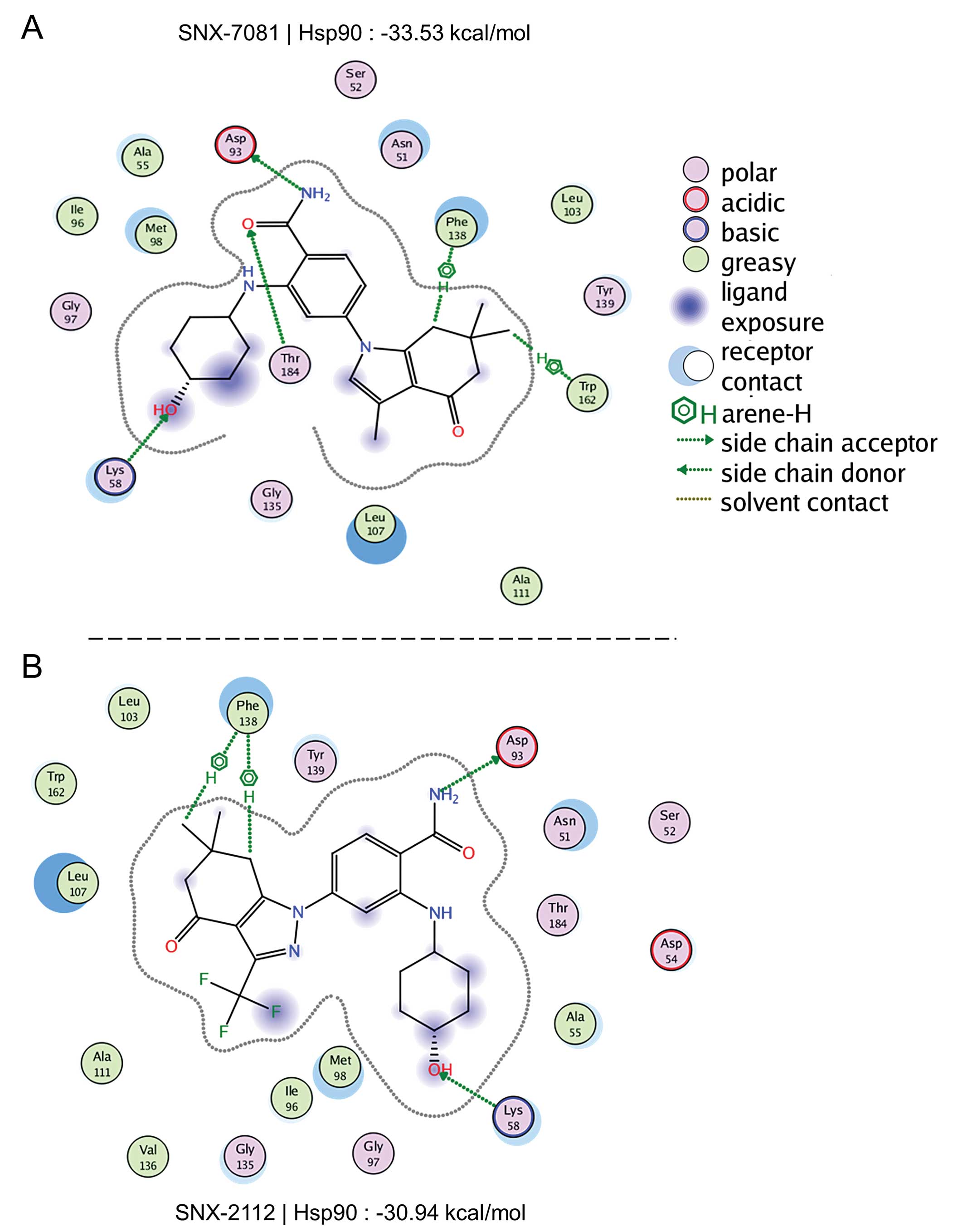|
1
|
Taipale M, Jarosz DF and Lindquist S:
HSP90 at the hub of protein homeostasis: emerging mechanistic
insights. Nat Rev Mol Cell Biol. 11:515–528. 2010. View Article : Google Scholar : PubMed/NCBI
|
|
2
|
Trepel J, Mollapour M, Giaccone G and
Neckers L: Targeting the dynamic HSP90 complex in cancer. Nat Rev
Cancer. 10:537–549. 2010. View
Article : Google Scholar : PubMed/NCBI
|
|
3
|
Hanahan D and Weinberg RA: Hallmarks of
cancer: the next generation. Cell. 144:646–674. 2011. View Article : Google Scholar : PubMed/NCBI
|
|
4
|
Mahalingam D, Swords R, Carew JS, Nawrocki
ST, Bhalla K and Giles FJ: Targeting HSP90 for cancer therapy. Br J
Cancer. 100:1523–1529. 2009. View Article : Google Scholar : PubMed/NCBI
|
|
5
|
Banerji U, O’Donnell A, Scurr M, et al:
Phase I pharmacokinetic and pharmacodynamic study of 17-allylamino,
17-demethoxy-geldanamycin in patients with advanced malignancies. J
Clin Oncol. 23:4152–4161. 2005. View Article : Google Scholar : PubMed/NCBI
|
|
6
|
Taldone T, Gozman A, Maharaj R and Chiosis
G: Targeting Hsp90: small-molecule inhibitors and their clinical
development. Curr Opin Pharmacol. 8:370–374. 2008. View Article : Google Scholar : PubMed/NCBI
|
|
7
|
Goetz MP, Toft D, Reid J, et al: Phase I
trial of 17-allylamino-17-demethoxygeldanamycin in patients with
advanced cancer. J Clin Oncol. 23:1078–1087. 2005. View Article : Google Scholar : PubMed/NCBI
|
|
8
|
Chinn DC, Holland WS, Yoon JM, Zwerdling T
and Mack PC: Anti-tumor activity of the HSP90 inhibitor SNX-2112 in
pediatric cancer cell lines. Pediatr Blood Cancer. 58:885–890.
2012. View Article : Google Scholar
|
|
9
|
Wang R, Shao F, Liu Z, et al: The Hsp90
inhibitor SNX-2112, induces apoptosis in multidrug resistant
K562/ADR cells through suppression of Akt/NF-kappaB and disruption
of mitochondria-dependent pathways. Chem Biol Interact. 205:1–10.
2013. View Article : Google Scholar : PubMed/NCBI
|
|
10
|
Wang SX, Ju HQ, Liu KS, et al: SNX-2112, a
novel Hsp90 inhibitor, induces G2/M cell cycle arrest and apoptosis
in MCF-7 cells. Biosci Biotechnol Biochem. 75:1540–1545. 2011.
View Article : Google Scholar : PubMed/NCBI
|
|
11
|
Bachleitner-Hofmann T, Sun MY, Chen CT, et
al: Antitumor activity of SNX-2112, a synthetic heat shock
protein-90 inhibitor, in MET-amplified tumor cells with or without
resistance to selective MET inhibition. Clin Cancer Res.
17:122–133. 2011. View Article : Google Scholar : PubMed/NCBI
|
|
12
|
Liu KS, Liu H, Qi JH, et al: SNX-2112, an
Hsp90 inhibitor, induces apoptosis and autophagy via degradation of
Hsp90 client proteins in human melanoma A-375 cells. Cancer Lett.
318:180–188. 2012. View Article : Google Scholar
|
|
13
|
Crissman HA and Steinkamp JA: Rapid,
simultaneous measurement of DNA, protein, and cell volume in single
cells from large mammalian cell populations. J Cell Biol.
59:766–771. 1973. View Article : Google Scholar : PubMed/NCBI
|
|
14
|
Rajan A, Kelly RJ, Trepel JB, et al: A
phase I study of PF-04929113 (SNX-5422), an orally bioavailable
heat shock protein 90 inhibitor, in patients with refractory solid
tumor malignancies and lymphomas. Clin Cancer Res. 17:6831–6839.
2011. View Article : Google Scholar : PubMed/NCBI
|
|
15
|
Huang KH, Veal JM, Fadden RP, et al:
Discovery of novel 2-aminobenzamide inhibitors of heat shock
protein 90 as potent, selective and orally active antitumor agents.
J Med Chem. 52:4288–4305. 2009. View Article : Google Scholar : PubMed/NCBI
|
|
16
|
Best OG, Che Y, Singh N, Forsyth C,
Christopherson RI and Mulligan SP: The Hsp90 inhibitor SNX-7081
synergizes with and restores sensitivity to fludarabine in chronic
lymphocytic leukemia cells with lesions in the TP53 pathway: a
potential treatment strategy for fludarabine refractory disease.
Leuk Lymphoma. 53:1367–1375. 2012. View Article : Google Scholar
|
|
17
|
Che Y, Best OG, Zhong L, et al: Hsp90
inhibitor SNX-7081 dysregulates proteins involved with DNA repair
and replication and the cell cycle in human chronic lymphocytic
leukemia (CLL) cells. J Proteome Res. 12:1710–1722. 2013.
View Article : Google Scholar : PubMed/NCBI
|
|
18
|
Rice JW, Veal JM, Fadden RP, et al: Small
molecule inhibitors of Hsp90 potently affect inflammatory disease
pathways and exhibit activity in models of rheumatoid arthritis.
Arthritis Rheum. 58:3765–3775. 2008. View Article : Google Scholar : PubMed/NCBI
|
|
19
|
Best OG, Singh N, Forsyth C and Mulligan
SP: The novel Hsp-90 inhibitor SNX7081 is significantly more potent
than 17-AAG against primary CLL cells and a range of haematological
cell lines, irrespective of lesions in the TP53 pathway. Br J
Haematol. 151:185–188. 2010. View Article : Google Scholar : PubMed/NCBI
|
|
20
|
Barta TE, Veal JM, Rice JW, et al:
Discovery of benzamide tetrahydro-4H-carbazol-4-ones as novel small
molecule inhibitors of Hsp90. Bioorg Med Chem Lett. 18:3517–3521.
2008. View Article : Google Scholar : PubMed/NCBI
|
|
21
|
Jin L, Xiao CL, Lu CH, et al:
Transcriptomic and proteomic approach to studying SNX-2112-induced
K562 cells apoptosis and anti-leukemia activity in K562-NOD/SCID
mice. FEBS Lett. 583:1859–1866. 2009. View Article : Google Scholar : PubMed/NCBI
|
|
22
|
Lee YH, Lee NH, Bhattarai G, et al:
PPARgamma inhibits inflammatory reaction in oxidative stress
induced human diploid fibloblast. Cell Biochem Funct. 28:490–496.
2010. View
Article : Google Scholar : PubMed/NCBI
|
|
23
|
Bettger WJ, Boyce ST, Walthall BJ and Ham
RG: Rapid clonal growth and serial passage of human diploid
fibroblasts in a lipid-enriched synthetic medium supplemented with
epidermal growth factor, insulin, and dexamethasone. Proc Natl Acad
Sci USA. 78:5588–5592. 1981. View Article : Google Scholar : PubMed/NCBI
|
|
24
|
Huang D, Gu Q, Ge H, et al: On the value
of homology models for virtual screening: discovering hCXCR3
antagonists by pharmacophore-based and structure-based approaches.
J Chem Inf Model. 52:1356–1366. 2012. View Article : Google Scholar : PubMed/NCBI
|
|
25
|
Kawano T, Kobayakawa T, Fukuma Y, et al: A
comprehensive study on the immunological reactivity of the Hsp90
molecular chaperone. J Biochem. 136:711–722. 2004. View Article : Google Scholar
|
|
26
|
Sreedhar AS, Kalmar E, Csermely P and Shen
YF: Hsp90 isoforms: functions, expression and clinical importance.
FEBS Lett. 562:11–15. 2004. View Article : Google Scholar : PubMed/NCBI
|
|
27
|
Hong DS, Banerji U, Tavana B, George GC,
Aaron J and Kurzrock R: Targeting the molecular chaperone heat
shock protein 90 (HSP90): lessons learned and future directions.
Cancer Treat Rev. 39:375–387. 2013. View Article : Google Scholar
|
|
28
|
Marzec M, Eletto D and Argon Y: GRP94: an
HSP90-like protein specialized for protein folding and quality
control in the endoplasmic reticulum. Biochim Biophys Acta.
1823:774–787. 2012. View Article : Google Scholar :
|
|
29
|
Matassa DS, Amoroso MR, Maddalena F,
Landriscina M and Esposito F: New insights into TRAP1 pathway. Am J
Cancer Res. 2:235–248. 2012.
|
|
30
|
Kamal A, Thao L, Sensintaffar J, et al: A
high-affinity conformation of Hsp90 confers tumour selectivity on
Hsp90 inhibitors. Nature. 425:407–410. 2003. View Article : Google Scholar : PubMed/NCBI
|
|
31
|
Vilenchik M, Solit D, Basso A, et al:
Targeting wide-range oncogenic transformation via PU24FCl, a
specific inhibitor of tumor Hsp90. Chem Biol. 11:787–797. 2004.
View Article : Google Scholar : PubMed/NCBI
|
|
32
|
Miyata Y: Hsp90 inhibitor geldanamycin and
its derivatives as novel cancer chemotherapeutic agents. Curr Pharm
Des. 11:1131–1138. 2005. View Article : Google Scholar : PubMed/NCBI
|
|
33
|
Harhaj EW and Sun SC: IKKgamma serves as a
docking subunit of the IkappaB kinase (IKK) and mediates
interaction of IKK with the human T-cell leukemia virus Tax
protein. J Biol Chem. 274:22911–22914. 1999. View Article : Google Scholar : PubMed/NCBI
|
|
34
|
Mori N, Yamada Y, Ikeda S, et al: Bay
11–7082 inhibits transcription factor NF-kappaB and induces
apoptosis of HTLV-I-infected T-cell lines and primary adult T-cell
leukemia cells. Blood. 100:1828–1834. 2002. View Article : Google Scholar : PubMed/NCBI
|
|
35
|
Zhou F, Zhang L, van Laar T, van Dam H and
Ten Dijke P: GSK3β inactivation induces apoptosis of leukemia cells
by repressing the function of c-Myb. Mol Biol Cell. 22:3533–3540.
2011. View Article : Google Scholar : PubMed/NCBI
|
|
36
|
Jin ZH, Kurosu T, Yamaguchi M, Arai A and
Miura O: Hematopoietic cytokines enhance Chk1-dependent G2/M
checkpoint activation by etoposide through the Akt/GSK3 pathway to
inhibit apoptosis. Oncogene. 24:1973–1981. 2005. View Article : Google Scholar : PubMed/NCBI
|
|
37
|
Jia XZ, Yang SY, Zhou J, et al: Inhibition
of CHK1 kinase by Go6976 converts 8-chloro-adenosine-induced G2/M
arrest into S arrest in human myelocytic leukemia K562 cells.
Biochem Pharmacol. 77:770–780. 2009. View Article : Google Scholar
|
|
38
|
Davis JM, Navolanic PM,
Weinstein-Oppenheimer CR, et al: Raf-1 and Bcl-2 induce distinct
and common pathways that contribute to breast cancer drug
resistance. Clin Cancer Res. 9:1161–1170. 2003.PubMed/NCBI
|















